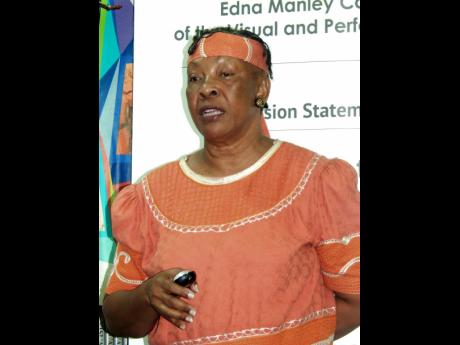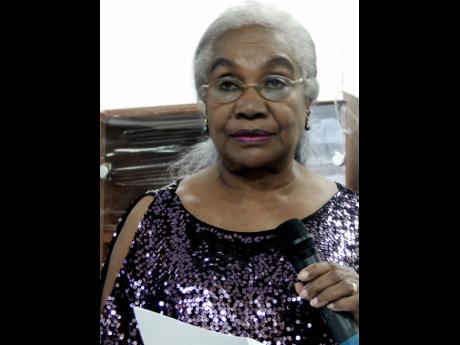For the Reckord | Talk on Purpose begins at Edna Manley - Blackwood Meeks starts series as college orator
Fresh to the new post of College Orator of the Edna Manley College of the Visual and Performing Arts (EMCVPA), Amina Blackwood Meeks recently launched a discussion series on the role and function of the arts in Jamaica, which she hopes will influence national development.
Dubbed He)Art Of The Matter: Talk On Purpose, Blackwood Meeks said the talks will take place "at least twice per semester." The well-known storyteller and former Director of Culture in the Ministry of Education said they are designed "to facilitate an exchange of ideas between students and leaders of the creative and cultural industries and their counterparts in business and community development."
Their ambitious purpose is "to increase the general understanding of what constitutes the arts and their impact on personal and national well-being."
Blackwood Meeks hopes the talks will facilitate EMCVPA graduates' participation in meaningful economic enterprise and broker the college's partnerships with the business community and opinion shapers to increase their understanding of the arts and its practitioners.
That should lead to the identification of emerging leaders in the arts, the development of community cultural plans and an increase in the power of the arts to influence national development. So states the position paper distributed at the recent launch in the college's School of Arts Management and Humanities.
University of the West Indies (UWI) Professor Emerita Maureen Warner-Lewis and EMCVPA School of Drama lecturer Eugene Williams were the inaugural guest speakers. The former's topic was 'The Role and Function of the Arts', while the latter's was 'Heritage and Creativity'.
"Art is one of the natural expressions of human living; it's what people do," Warner-Lewis said. "From the earliest evidence of humans' existence on this planet, our species has shown a consciousness to recreate scenes of the life-forms in the environment."
Examples were the drawings and paintings of animals on cave walls in Europe. Moving closer to home, she said that "art may establish for the creator and performer a sense of place - in our case, a sense of our Caribbeanness." Elaborating on her thesis that "the arts are bound up with our progressive forging of a national identity", Warner-Lewis continued:
National Heroes
"Since the 1940s and 50s there has been a growing sense of Jamaicanness. It is tied up with persons identified as National Heroes and there are nationally acclaimed figures, such as Miss Lou, Bob Marley, Mass Oliver, Usain. There is a growing sense of the uniqueness of our native language the appreciation of local food such as jerk meat, bun and cheese, breadfruit. There has been a forging of a national music - mento, reggae, skanking, deejay, dancehall."
In the visual arts, she said, "there is the depiction of local scenes and foliage and social behaviour and customs... . There is also reproduction of images of the African and European and Asian physiognomy of our people."
But the arts do not always make us complacent and contented, Warner-Lewis pointed out, and "drama and narrative and visual arts can disturb accepted perspectives... , and question old ideas and traditional habits of thought and action." She cited Trevor Rhone's play Old Story Time, which "exposes the colour discrimination and self-deprecation of Jamaican people" and protest songs by Buju Banton and Bob Marley.
Eugene Williams told the audience that he had been at the college for 37-years (even before it was the EMCVPA). First he was a student of the School of Drama, then a lecturer at the school and, for 17-years, director of the school.
Explaining his decision to come to Jamaica from his native Guyana, Williams spoke of the "enriching experience" he had participating in the first CARIFESTA in Guyana in 1972. The arts festival "captured the tremendous political optimism and the transformative cultural force that was being unleashed across the region since the decade of independence in the 60s."
He was attracted to the then Cultural Training Centre (CTC, predecessor of the EMCVPA) because of his awareness of "the burgeoning world of Jamaican professional theatre, the growing stridency of Rastafari, the race and class protestations of reggae music, the growing recognition and study of traditional forms, the emerging cultural power of the Jamaican creole which had travelled so effectively through the music and, importantly, the severe political violence of the seventies that was driven by decades of collective activism for self-determination."
He recalled the cultural optimism and determination to build a nation state in our own image led very quickly to the establishment of the CTC and cultural movements in the Anglo-Caribbean transitioning into what he called the 'Get Go' period from the mid-70s into the mid-80s.
In the School of Drama there were courses in Caribbean culture and Caribbean or African-oriented productions. In the schools of Dance and Music traditional and contemporary cultural forms were explored. Outside the CT, there were seminal works in the National Dance Theatre Company (NDTC), Caribbean plays by Dennis Scott, Stafford Aahani and Trevor Rhone and dub poetry became popular.
But in the mid-80s there was a socio-economic collapse in Jamaica and other countries in the region. "The idea of the independent nation state was derailed by the emerging neo-liberal economic model, which lead to the socio-economic chaos now pervasive across the world," Williams said. This caused much of the political and cultural change evident today.
"Entertainment, commercialism and marketing of the product began to take precedence over the creative process and the shepherding of the larger socio-cultural project - the empowering humanistic process of a people," Williams lamented. Still, he admitted, the arts landscape became more dynamic and the players more varied. Roots and commercial theatre boomed, deejay music flourished.
Williams said the CTC transitioned in the 90s into the more professional, more structured EMCVPA and, looking forward he said the challenge at this time was to establish a balance between the energy of academic and administrative reconstruction on one hand and the artistic creativity that led the way in the Get Go period on the other.




